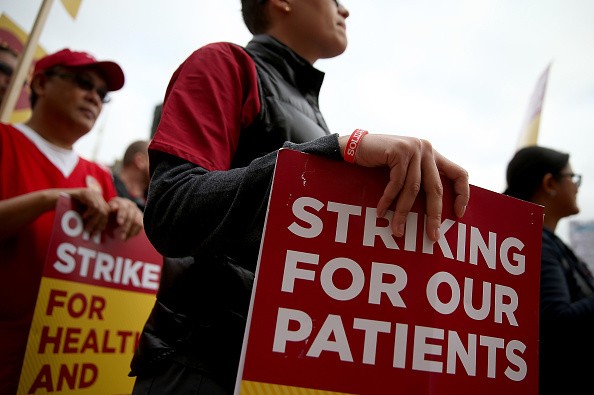California Nurses to Go on Strike on Christmas Eve Over Work Conditions
California nurses threaten to hold a strike on Christmas eve as they continue to face serious problems with staffing, personal protective equipment (PPE), and other conditions that not only put them in danger but also patients.

California Governor Gavin Newsom ordered a regional lockdown once the hospital capacity fell below 15 percent to ensure that the state's hospital capacities will not be overwhelmed with the increasing number of COVID-19 infections. But nurses now threaten to hold a strike during Christmas Eve.
Read also: Read also: California to Impose Regional Stay-At-Home Order: Here's What You Need to Know
Nurses To Hold Christmas Eve Strike
COVID-19 infections continue to swell in California and are predicted to increase in huge numbers after the holiday season. State health experts and officials want to avoid this.
According to a published article in NBC News, nurses are planning to hold a strike that will begin on Christmas eve. The nurses alleged that current work conditions put their lives at risk. The strike will affect the operations of three Southern California hospitals.
The Hospital Corporation of America received on Monday a 10-day notice of the intent to strike by about 2,450 registered nurses and licensed healthcare professionals across its hospitals, according to a statement released by the SEIU Local 121 union chapter that represents them.
NBC News reported that the said strike will begin on Dec. 24 and will continue until Jan. 3 at Riverside Community Hospital, Los Robles Regional Medical Center, and West Hills Hospital & Medical Center.
Terry Carter, the spokesperson for SEIU Local 121, said the strike is due to the frustration in contract negotiations for four bargaining units over workplace safety and staffing.
Issues Nurses Wanted To Address
Carter said members of the bargaining committee felt that the Hospital Corporation of America management were unwilling to offer substantive counters to their comprehensive proposals.
"Management just keeps coming back with weak, unenforceable, and vague lip service," Carter noted.
There were many issues that the nurses raised, and a few of these are the following:
- Dangerously low staffing levels
- Lack of adequate Personal Protective Equipment
According to the union, these are the two important concerns of the nurses and licensed healthcare workers at risk for COVID-19 infections. The COVID-19 pandemic continues to overwhelm frontline workers.
In a statement, the Hospital Corporation of America said it has bargained in good faith to secure a new labor agreement. They also criticized the nurses' plan to hold a strike and said that abandoning the bedside was unconscionable.
The statement added that: "As a result of the union's decision to strike during this challenging time, our hospitals must limit their full scope of services in order to ensure nurses are available to care for patients with the highest needs."
Struggles of Nurses
Nurses at Riverside Community Hospital have been found struggling over staffing issues even before the pandemic began.
According to Katherine Montanino, an ICU nurse and a bargaining team member, they had reached an agreement with the hospital that worked well, but it expired last May.
Montanino said: "It's so emotionally draining to do these back and forth, I mean we're nurses, we're not lawyers. We want to be there to take care of people. We're prone to get taken advantage of because of our moral and ethical standards and our need to want to help and take care of people."
There was also a strike in June over the bargaining agreement, and bargaining members began new negotiations with the hospital, on top of their scheduled shifts.
Montanino noted that the decision to strike was "an internal moral and ethical struggle," but 92 percent of the nurses voted to do the strike.
Subscribe to Latin Post!
Sign up for our free newsletter for the Latest coverage!
© 2025 Latin Post. All rights reserved. Do not reproduce without permission.














